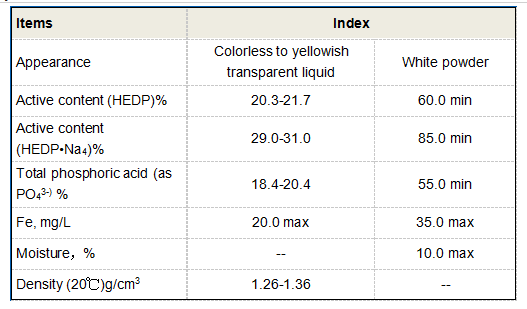organic phosphonate
The Significance of Organic Phosphonates in Modern Chemistry
Organic phosphonates are a fascinating class of compounds that have gained prominence in various fields of chemistry due to their unique structural features and diverse applications. As derivatives of phosphonic acid, these compounds contain a carbon-phosphorus (C-P) bond, which distinguishes them from traditional phosphates. This article explores the significance of organic phosphonates, their synthesis, applications, and future prospects.
One of the most notable characteristics of organic phosphonates is their stability and versatility. The C-P bond is highly resistant to hydrolysis, making phosphonates ideal for use in numerous chemical applications where stability under harsh conditions is required. This stability also allows them to function effectively in biological systems, which has led to their exploration in pharmaceutical applications.
In recent years, organic phosphonates have gained attention in the field of medicinal chemistry. Many phosphonate compounds exhibit biological activity, including antibacterial, antifungal, and antiviral properties. A prime example is the development of phosphonate prodrugs, which enhance the bioavailability of active pharmaceutical ingredients. These compounds can be strategically designed to release the active drug in a controlled manner, thus improving therapeutic efficacy while minimizing side effects.
The agricultural sector also benefits from the unique properties of organic phosphonates. They are used as herbicides and fungicides, exhibiting effectiveness against a variety of pests and diseases. Additionally, phosphonate-containing fertilizers are developed to improve plant growth and resilience against stress factors. This has become increasingly important in sustainable agriculture, where the goal is to enhance crop yield while minimizing environmental impact.
organic phosphonate

Moreover, organic phosphonates play a crucial role in materials science. They are employed in the synthesis of polymers, specifically as additives that improve mechanical properties and thermal stability. The incorporation of phosphonates into polymer matrices can result in materials with enhanced flame retardancy, making them ideal for use in construction, electronics, and automotive applications.
Synthesis of organic phosphonates typically involves the reaction of phosphorus compounds with carbon nucleophiles. Various methods such as the Michael addition, alkylation, and condensation reactions facilitate the formation of this diverse class of compounds. Researchers are continually developing new synthetic routes to enhance yield and minimize environmental impact, aligning with green chemistry principles.
Looking ahead, the future of organic phosphonates appears promising. Ongoing research aims to explore their potential in novel areas such as nanotechnology and renewable energy. For instance, phosphonates are being investigated as agents in the development of phosphorescent materials and in improving the efficiency of solar cells.
In conclusion, organic phosphonates represent a vital segment of modern chemistry with far-reaching implications across various disciplines. Their stability, versatility, and biological activity make them valuable in pharmaceuticals, agriculture, and materials science. As researchers continue to unlock their potential, organic phosphonates are poised to play an increasingly important role in addressing global challenges, particularly in health, food security, and sustainable development.
-
Water Treatment with Flocculant Water TreatmentNewsJun.12,2025
-
Polymaleic AnhydrideNewsJun.12,2025
-
Polyaspartic AcidNewsJun.12,2025
-
Enhance Industrial Processes with IsothiazolinonesNewsJun.12,2025
-
Enhance Industrial Processes with PBTCA SolutionsNewsJun.12,2025
-
Dodecyldimethylbenzylammonium Chloride SolutionsNewsJun.12,2025





